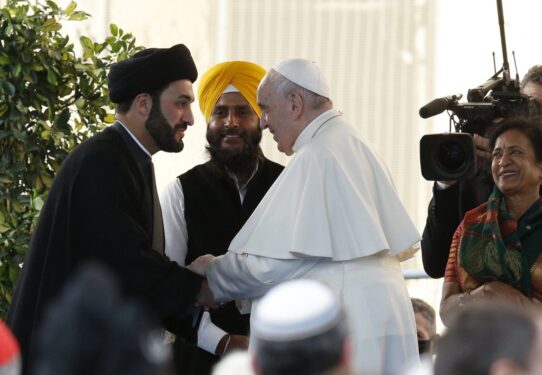
By James Martone
UNITED NATIONS (OSV News) — Pope Francis and his efforts to promote interreligious harmony featured prominently in United Nations discussions focusing on what could be done about rising hatred, discrimination and violence against Muslims.
The world’s nearly 2 billion Muslims “are Arabs, Africans, Europeans, Americans and Asians” and “hail from all corners of the world,” U.N. Secretary-General António Guterres said in his March 10 address during the discussions at the U.N.’s New York headquarters.
“But they often face bigotry and prejudice for no other reason than their faith,” said Guterres, stressing the need for the world to ramp up “political, cultural, and economic investments in social cohesion.”
Guterres thanked “religious leaders across the world who are joining hands to promote dialogue and interfaith harmony,” and highlighted a 2019 document co-written by Pope Francis and the grand imam of al-Azhar, Sheikh Ahmed el-Tayeb, one of Sunni Islam’s highest authorities, as “a model for compassion and solidarity” for the world to follow.
In that document, titled “Human Fraternity for World Peace and Living Together,” Pope Francis and el-Tayeb called on global leaders and architects of international policy and economy “to work strenuously to spread the culture of tolerance and of living together in peace.”
“Muslims of the East and West, together with the Catholic Church and the Catholics of the East and West, declare the adoption of a culture of dialogue as the path; mutual cooperation as the code of conduct; reciprocal understanding as the method and standard,” stated the document, also known as the “Abu Dhabi agreement” for where it was signed.
In 2022, the U.N. designated March 15 as the International Day to Combat Islamophobia. Islamophobia is the fear of, hatred of, or prejudice against Muslims, including those perceived to be Muslim, on account of their religion Islam.
The related mid-March discussions at the U.N. and elsewhere marked that international day’s first year in existence.
At the talks on March 10, co-hosted by U.N. member Pakistan, Pakistan’s Foreign Minister Bilawal Bhutto Zardari lamented what he said was “unfounded phobia of Islam and its adherents,” which he called “a sad reality of our times.”
“This phenomenon is neither new nor an irrational bias held by the few, as often portrayed,” the minister said.
He urged the U.N. Secretary General to formulate an action plan in coordination with Islamic countries to halt and reverse Islamophobia.
At a press conference the same day, Zadari too evoked Pope Francis, hailing the pontiff’s visits to Muslim-majority countries and his work to strengthen fraternal ties between religions.
“I would like to welcome and praise the efforts of His Holiness, Pope Francis, particularly to do with interfaith harmony,” Zardari said in response to a question from OSV News.
“If members of different religions and religious groups come together, I think they’ll find that there is far more that we agree upon, than … we disagree upon,” said the minister, adding that “someone with the prominence of (Pope Francis) himself I think can play quite a significant role.”
Days later, at the U.N.’s Geneva headquarters, similar talks took place to mark the International Day to Combat Islamophobia.
Addressing those talks, Tatiana Valovaya, the director general of the U.N.’s office in Geneva, said March 17, “Regrettably, our world continues to face rising hatred, discrimination and violence against Muslims.”
That included religiously motivated attacks, online and offline hate speech, exclusion, Islamophobic discourse and negative stereotypes, which Valovaya said were threatening not only Muslim communities, but “broader society” as well.
“The role of religious leaders across the world is important, to promote dialog and interfaith harmony,” she said, likewise evoking the declaration co-authored by Pope Francis and el-Tayeb.
The declaration, she reiterated, “is a model for compassion and human solidarity.”
